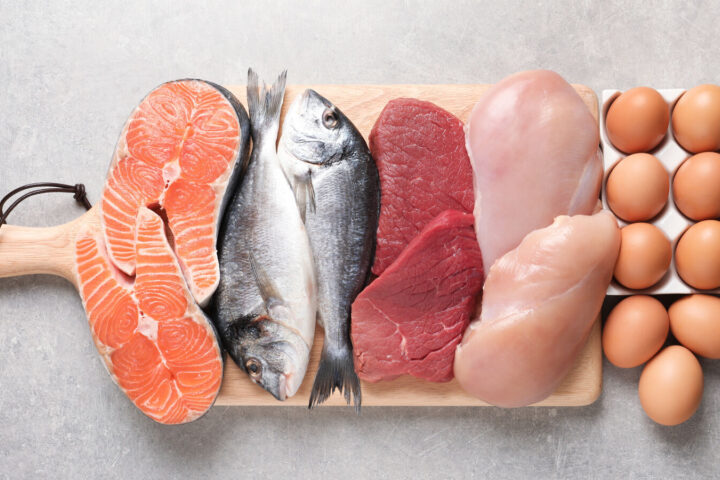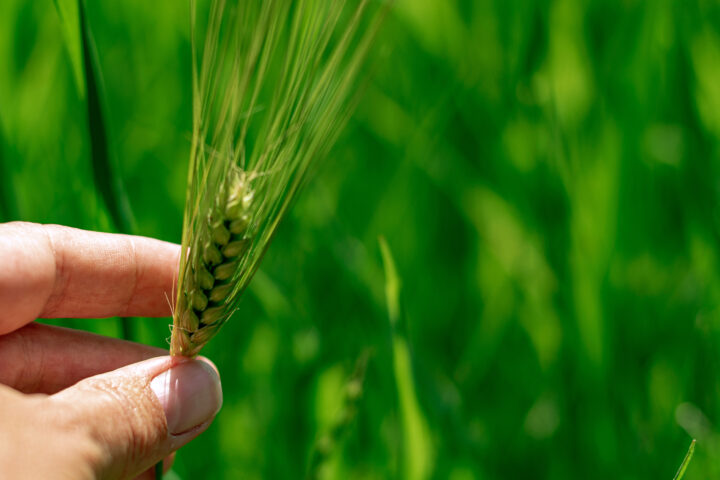
Gene Editing for Stronger Supply Security in the UK
Russia’s invasion of Ukraine has led to a scarcity of wheat and big price increases for the staple on agricultural commodity markets. The United Kingdom wants to strengthen its domestic supply security by relying on more resistant crops. With this aim in mind, plans call for passing a new law that would allow cultivation of gene-edited plants. Agricultural productivity is once again becoming increasingly important in European countries. Switzerland also needs to produce more.
Monday, May 30, 2022
Cultivating plants bred using gene editing is intended to increase the country’s domestic production of food. Gene editing makes it possible to breed plants more efficiently than ever before, and these crops exhibit tolerance to dry weather, heat, and wet conditions, as well as resistance to pests and diseases. The law to permit cultivation of such crops is expected to take effect by no later than the end of 2022. This would allow the first gene-edited food products to be sold in UK supermarkets beginning in 2023. Rapid adaptation of the legal basis is now possible because the UK is no longer in the EU, where gene editing is subject to much stricter regulations.
Switzerland is dawdling
While the UK has decided to boost its domestic production of food products, thus making a sustainable contribution to global supply security, Switzerland is dragging its feet. Swiss lawmakers have, however, made a slight course correction on the subject of gene editing. Plants bred using gene editing will now be excluded from the country’s GMO moratorium. That’s a step in the right direction but still falls short. In addition, there is cause for concern that the new law, which the Federal Council must draft by 2024, will turn out to be very restrictive or end up on the back burner.
A step backward for new crop protection products
When it comes to crop protection, Switzerland has even taken a step backward. Approval of highly specific and thus more environmentally friendly crop protection products has in effect been put on ice. Meanwhile, countless new products have been held up by the authorities for years or are being blocked by Swiss associations' right of appeal. At the same time, more and more crop protection products are being taken off the market. These products—for which there are no alternatives in most cases—are indispensable for crops such as rapeseed, sugar beets, and a number of vegetable varieties. Many farmers no longer know how they should adequately protect their crops. But the problem could easily be solved: A great deal would be achieved if Switzerland would recognize the EU approval of new active ingredients and products. After all, it is ironic that Swiss authorities accept EU decisions that call for withdrawing authorization for crop protection products, but not decisions that approve such products. They undertake their own approval process, and actual registration of the products then usually comes years after the EU approval, if at all. As a result, Swiss farmers are losing valuable time to employ state-of-the-art products that can increase production in a sustainable way. This puts them at a disadvantage in relation to their EU competitors.
Weakening of domestic production
In April 2022 the Swiss Federal Council adopted the first package of regulations “for clean drinking water and more sustainable agriculture.” The adopted amendments included disproportionate measures that serve to weaken domestic food production. The new Waters Protection Ordinance, which is now in the consultation phase, is expected to place additional restrictions on the range of crop protection products available in Switzerland. In both of these instances, the authorities have decided in favor of a very restrictive implementation of the already excessive law adopted by the Swiss Parliament.
More imports
All of these factors combined will lead to more imports—the opposite of what other countries hope to achieve at this point in time. The current developments in Switzerland are exacerbating an already difficult situation. Even in the domestic marketplace, the changes with regard to the cost and availability of food are contributing to inflation, which consumers feel immediately in their purchasing power. But the hardest hit victims are the poorer regions of the world, from which Switzerland in turn imports food. Food price increases have devastating impacts especially in poor countries.
Environmentally friendly intensification is the objective
The aim of global agriculture must be to reduce consumption of resources while increasing productivity. This objective should also be pursued by Swiss agricultural policy. It is expected that the world’s population will increase to 10 billion by 2050. The impacts of climate change will lead to increased uncertainty when it comes to crop yields. Under these conditions, an extensification strategy is not a reasonable option. Environmentally friendly intensification of production can be achieved only through innovative technologies. From gene editing to the latest, highly specific crop protection products to digitalization—Swiss farmers must have access to all the tools. Continuing to ignore these technologies in Switzerland and the EU is in contradiction of forward-looking policy. While other countries are making progress and contributing their share, in Switzerland the politicians and authorities are failing to recognize the signs of the times.
Sources
Related articles

Why Strict GMO Regulation Stifles Innovation
New breeding techniques such as CRISPR-Cas are considered key to developing resilient crops, stable yields and reducing the need for plant protection products. ETH professor Bruno Studer warns that overregulating these technologies strengthens precisely those large agricultural corporations that critics seek to curb, while excluding smaller breeders and start-ups from the market.

A Superfood with Benefits and Challenges
Sweet lupin is Biovision’s “Superfood of the Year 2026.” It delivers high protein content, improves soils and supports biodiversity. Yet a closer look at agricultural practice shows that without breeding, crop protection and innovation, even this superfood remains a challenging crop.

Sales bans due to PFAS: Should we be worried?
After spectacular sales bans on fish and meat due to PFAS contamination, consumers are asking themselves: How dangerous are these substances really – and what can still be placed in the shopping basket without concern?

How German Experts View New Breeding Techniques
In hardly any other country is the idyllic image of organic farming cultivated in the public sphere as carefully as in Germany. Naturalness and rural authenticity are powerful mental refuges for many Germans. Against this backdrop, it is hardly surprising that resistance to new breeding techniques is strong – and that ignorance about the realities of organic farming sometimes appears almost deliberate.

